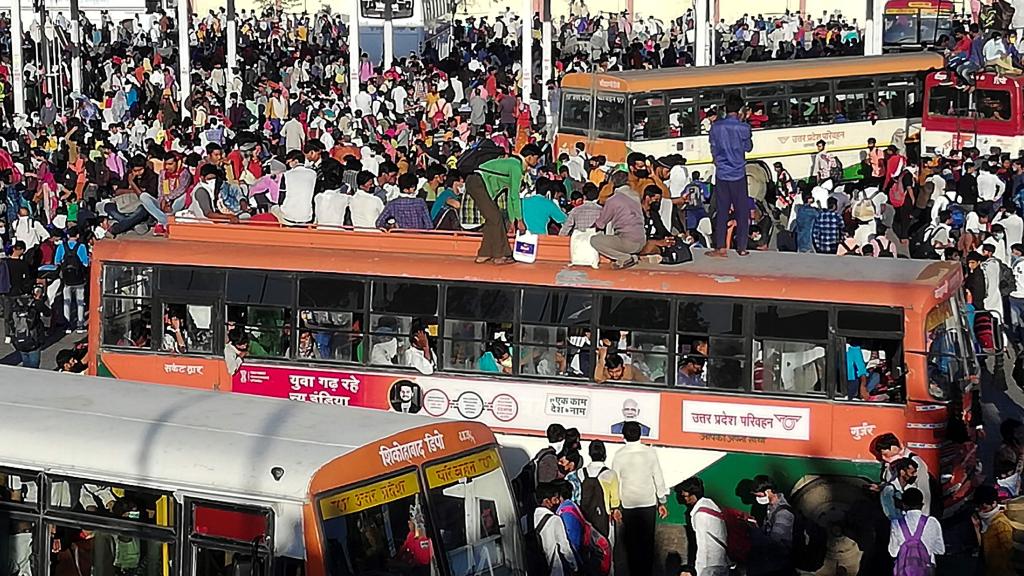
During crisis, the relationship that any subject shares with the state comes out in the open in its starkness and bareness. Leaving the opaqueness of everyday life, crisis becomes the limit point where violence of the state is completely unmasked. Because of COVID 19, we are confronted with this ugly violence that is put on certain section of our society. When India announced its abrupt unprepared lockdown for 21 days, it clearly made this distinction between the population that can relatively safely be quarantined in their homes, while showing complete dismissal and apathy towards the large section of our society. Social media is constantly flashing images and videos of tens of thousands of migrant workers who are making way back to their homes as they walk out of the cities – same cities that they have not just built but have been running too. They are walking hundreds of kilometres, at times accompanied with older people and children, which is the most vulnerable group in the context of present crisis. From disturbing images of thousands of them being stranded at the bus terminal, to dying on their ways, and even sprayed with disinfectants as they reach their homelands demonstrate how devalued their lives are. How do we understand the apathy of the state where clearly an underprivileged section is made to forgo their right on a dignified life.
State locates lives on a continuum of dispensability. The sheer fact of having a life doesn’t attribute value to it, as lives are valued differently by the State. The migrant workers in this case can be put in this dispensable population, as State is able to wash off its hands with its meagre response towards their plight. Judith Butler, understands this as ‘matrix of grievablilty’ pointing out how all the lives that get lost are not grieved in a similar fashion. It is only the valued, indispensable lives that are considered worthy of a grief when lost, while rest fall out of this matrix and can easily be disposed off. Migrant workers, as a present case in point, clearly fall in this category of dispensability as their lives are not even considered worthy of being grieved when lost.
Modern power of the State stands as the fulcrum that decides and divides populations on this disposability and grievablilty. Michel Foucault, in Society Must be Defended, lays foundation for such an analysis as he points out the distinction between earlier sovereign rule and the present modern power. If the earlier sovereign rule directly kills its subjects, the modern power doesn’t need to kill directly. Centered around death, sovereign’s relationship with its subjects can be understood through its right to ‘take life or let live’. Contrastingly, instead of that old right of the sovereign, the modern power is interested in life, and is characterized by ‘to make live or to let die’. Instead of directly killing its dispensable population, it just lets them die. As State mutely allows the migrant workers to fend for themselves, it exercises its right of letting them die on their own.
It needs to be noted that the State is able to exercise its right of letting certain section die, because of the larger silence and indifference of our society, which not just matches with the apathy of the state, but even provides it with legitimacy. The privileged class that hailed our government on getting the affected population back to country by crossing international borders through special planes ironically is not even aware about the sad state of our migrant workers. There is a simple denial and disbelief of this event that is occurring in open, public sphere, under the visibility of everyone. It even goes to the extent of calling it wrong or exaggerated reporting. Busy in finding ways of entertaining themselves while quarantined in homes, the complacency of our society demonstrate its delusional nature. Hannah Arendt examines the same phenomenon while talking about Nazi Germany in her classic work Banality of Evil that covers the trial of Adolf Eichmann, as she points out how ‘German society of eighty million people had been shielded against reality and factuality by…self-deception, lie and stupidity’(:52). The practice of self-deception became common and made holocaust possible. This delusional nature of civil society is evident as we go through the present problem of migrant labourers with denial, disbelief and dismissal.
If delusion is at one end of the spectrum, then the attitude at the other end is more disinterested and brutal. Marked with anger, it finds these workers bodies contagious and health hazard to the entire nation. Attributed with illiteracy and stupidity, they are not just blamed for their own predicament, but are even held culpable for being contagious, contaminating and threatening. The privileged civil society instead of being empathic and caring towards the migrant workers, shamelessly worries about itself safety again, refusing to take any responsibility.
It is this silence and delusion of our society that makes this large-scale despair possible, where there is only wrong, but no outrage against it. It echoes with the dark times that Bertolt Brecht captures in his poem “To Posterity”,
“Indeed I live in the dark ages!
A guileless word is an absurdity. A smooth forehead betokens
A hard heart. He who laughs
Has not yet heard
The terrible tidings.
Ah, what an age it is
When to speak of trees is almost a crime
For it is a kind of silence about injustice!
And he who walks calmly across the street,
Is he not out of reach of his friends
In trouble?”













